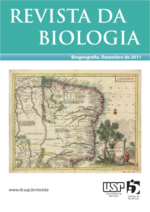Gareth Nelson: current challenges and the future of biogeography
DOI:
https://doi.org/10.7594/revbio.07.09Keywords:
Distribution of organisms, historical biogeography, history of biology, paradigm, science.Abstract
The distribution of organisms has captured the attention of scientists for a long time. Great naturalists studied their groups of interest and described geographic patterns, evoking dispersion to explain their distribution. The development of phylogenetic systematics in the sixties represented a paradigm shift for biogeography, incorporating the concept of vicariance, process through which groups of organisms are isolated and differentiate, providing testable models in biogeography. In this context emerged Gareth Nelson, a North-American ichthyologist that contributed to the development of Cladistic Biogeography, providing its theoretical basis and proposing methodologies for its study. Herein, Nelson answers an interview regarding some of the main topics in modern biogeography such as its tendencies and future, interface with conservation, among other epistemological questions.Downloads
Download data is not yet available.
Downloads
Published
2018-04-23
Issue
Section
Opinião
License
We ensure that our journal does not retain any copyright and that these are exclusive of the author(s) of the text. In that sense, we intend to break any restrictions to the published material and to achieve more intensely our goal of communicating science.
How to Cite
Mattox, G. M. T. (2018). Gareth Nelson: current challenges and the future of biogeography. Revista Da Biologia, 7(1), 49-55. https://doi.org/10.7594/revbio.07.09






